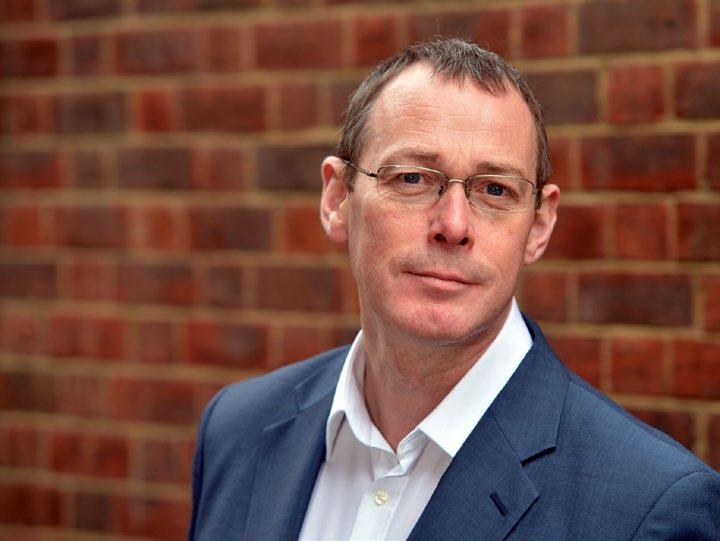OUR FRIEND IN THE
NORTH WEST
Television www.rts.org.uk May 2021
Nine Lives Media
M
ediaCity in Salford, Greater Manchester, began its rapid expansion into a world- leading TV production centre 10 years ago, when BBC staff moved in soon after Dock 10 launched its new studios and post-production business. Back in 2007, when Salford City Council and the Peel Group won their joint bid to house the BBC’s new northern base, I received a call from a very animated Felicity Goodey, the main visionary behind the project. With great passion, she told me how MediaCity’s piazza would be bigger than Trafalgar Square and would become a tourist destination. Felicity’s interest in Salford’s derelict docks and the Manchester Ship Canal began in the 1980s, when she was the BBC’s business correspondent for the regional news show North West Tonight. She was right on both counts. This once downtrodden area, where A Taste of Honey was famously filmed, attracts visitors from across the country. Its size has been integral to its success. The BBC employs around 3,000 people on this vast, 80-hectare site, but its move to Salford as a founder partner in MediaCity has resulted in another 4,000 jobs being created. In its recent report on the impact of the BBC on the UK economy, KPMG says employment in the digital and creative sector in Salford jumped by 142% between 2010 and 2019, while the number of digital and creative businesses shot up by 70%. As every TV viewer in the UK pays the licence fee, it is vital that the BBC creates jobs across the whole country
Cat Lewis celebrates MediaCity’s first decade as a UK production hub
and not just in London. Everyone hopes Channel 4’s new bases in Leeds, Bristol and Glasgow will mirror the success of the BBC’s move to MediaCity – and help the Government’s “levelling up” agenda. Having major TV production bases in different cities also provides routes into the industry for people from diverse backgrounds. Enabling such voices to be heard helps unify the UK by ensuring the programmes we produce properly represent and engage our viewers. This is increasingly important when we are competing with global media giants such as Netflix, Amazon and Disney. BBC Director-General Tim Davie recently confirmed that he is doing even more than his predecessors in delivering to the whole of the UK. For the first time in the
corporation’s history, the target is to ensure that 60% of production will come from the nations and regions. Therefore, says KPMG, by 2027-28 the BBC will have spent cumulatively £700m more outside of London. This will generate an estimated additional economic benefit of more than £850m. But it’s not just about money and jobs, it’s also about how the BBC can increase its ratings and relevance by better reflecting the country as a whole. I’ve never understood why important programmes such as Radio 4’s Today and BBC Two’s Newsnight are always produced in, and broadcast from, London. So it is fantastic to hear that many editions of these shows will now be hosted from around the UK. However, to ensure proper repre sentation, it’s equally important that these programmes have members of their production teams living in the nations and regions. Now we are all used to working remotely, surely this is a great way to ensure such shows have less of a “Westminster agenda” and are more in touch with audiences? Plans by Tim Davie and Charlotte Moore for a long-running drama series based in the north are also exciting. Hopefully, it will have more appeal to viewers by capturing the comedy, optimism and warmth of Coronation Street, rather than the anxious gloom of EastEnders. It’s been really exciting to watch more jobs, more representation and more creativity happening here in MediaCity over the past 10 years. Happy 10th anniversary. Let’s hope the licence fee continues to be used to secure and build on its success. n Cat Lewis is CEO of Nine Lives Media and a former Chair of RTS North West.
15












